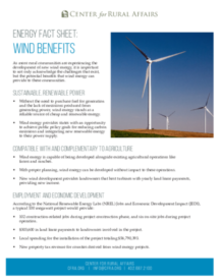Policy
As more rural communities are experiencing the development of new wind energy, it is important to not only acknowledge the challenges that exist, but the potential benefits that wind energy can provide to these communities.
Sustainable, Renewable Power
- Without the need to purchase fuel for generation and the lack of emissions produced from generating power, wind energy stands as a reliable source of cheap and renewable energy.
- Wind energy provides states with an opportunity to achieve public policy goals for reducing carbon emissions and integrating new renewable energy to their power supply.
Compatible with and Complementary to Agriculture
- Wind energy is capable of being developed alongside existing agricultural operations like farms and ranches.
- With proper planning, wind energy can be developed without impact to these operations.
- New wind development provides landowners that host turbines with yearly land lease payments, providing new income.
Employment and Economic Development
According to the National Renewable Energy Labs (NREL) Jobs and Economic Development Impact (JEDI), a typical 100 megawatt project would provide:
- 102 construction-related jobs during project construction phase, and six on-site jobs during project operation.
- $303,600 in land lease payments to landowners involved in the project.
- Local spending for the installation of the project totaling $56,790,393.
- New property tax revenue for counties derived from wind energy projects


